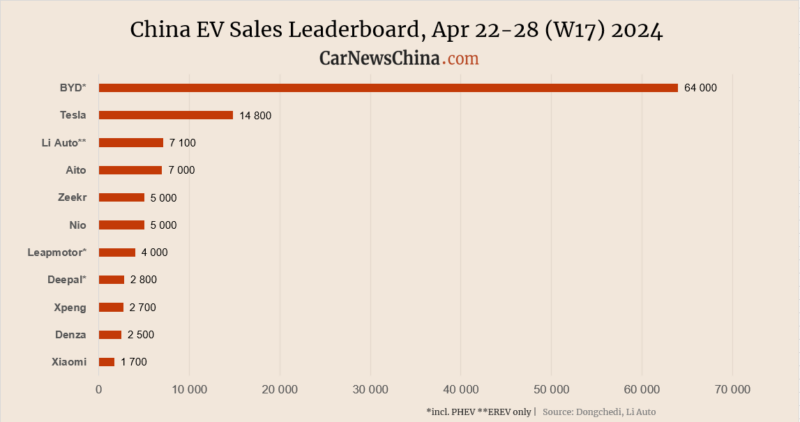China EV registrations in W17: Xiaomi 1,700, Nio 5,000, Tesla 14,800, BYD 64,000
The market was mainly up in China during week 17 of the year (April 22 – 28). Xiaomi registered 1,700 units of SU7, the same as the week before; Nio was 67% up, Tesla 185% up, and BYD nearly 8% up from the week before.
The weekly sales data were published by Li Auto, which recently stopped releasing the reports. Chinese outlet Dongchedi took over and started publishing the sales every Tuesday. The background data are weekly insurance registrations. The numbers are rounded and present new energy vehicles (NEV), the Chinese term for BEVs, PHEVs, and EREVs (range extenders). To be completely precise, it also includes hydrogen vehicles (FCEVs), but their sales are almost non-existent in China.
BYD got the first spot as usual, registering 64,000 units, up 7.56% from 59,500 units in the previous week. BYD sold 219,500 vehicles between April 1 and 28.

Tesla saw a significant surge in sales, with 14,800 units sold, marking an 184.62% increase from the 5,200 units sold in the previous week. Tesla’s total sales for the period between April 1 and 28 were 28,080 units.
Tesla sells two cars in China – Model 3 sedan, which starts at 245,900 yuan (33,3960 USD), and Model Y, which starts at 258,900 yuan (35,760 USD).
Tesla sales breakdown:
- Model Y: 12,600 units
- Model 3: 2,200 units

Li Auto also demonstrated solid growth, selling 7,100 units, a 57.78% increase from the 4,500 units sold in the previous week. Li Auto’s total sales for the period between April 1 and 28 were 24,370 units.
Huawei-backed Aito achieved a moderate increase in sales, with 7,000 units sold, up 16.67% from the 6,000 units sold in the previous week. Aito’s total sales for the period between April 1 and 28 were 22,040 units.
Zeekr showed fair enough growth, selling 5,000 units, a 56.25% increase from the 3,200 units sold in the previous week. Zeekr’s total sales for the period between April 1 and 28 were 11,900 units.
Nio also demonstrated strong growth, selling 5,000 units, a 66.67% increase from the 3,000 units sold in the previous week. Nio’s total sales for the period between April 1 and 28 were 14,120 units.

Stellantis-backed Leapmotor saw a slight increase in sales, with 4,000 units sold, up 2.56% from the 3,900 units sold in the previous week. Leapmotor’s total sales for the period between April 1 and 28 were 15,130 units.
Deepal maintained steady sales, with 2,800 units sold, the same as the previous week. Deepal’s total sales for the period between April 1 and 28 were 7,600 units.
Volkswagen-backed Xpeng experienced a modest increase in sales, with 2,700 units sold, up 8.00% from the 2,500 units sold in the previous week. Xpeng’s total sales for the period between April 1 and 28 were 8,020 units.
BYD’s Denza showed solid growth, selling 2,500 units, a 25.00% increase from the 2,000 units sold in the previous week.
Xiaomi maintained its sales performance, with 1,700 units sold, the same as the previous week. Xiaomi’s total sales for the period between April 1 and 28 were 6,880 units. Xiaomi only sells electric sedan SU7.

Here is the last of the top 10 best-selling EVs priced over 250,000 yuan (34,500 USD):
- Zeekr 001: 3,300
- Nio ET5/ET5T: 1,900
- Nio ES6: 1,800
- Avatr 12: 1,000
- Nio EC6: 700
- Xpeng G9: 500
- Xpeng X9: 500
- Aito M9: 400
- Denza N7: 300
- Nio ES8: 200



